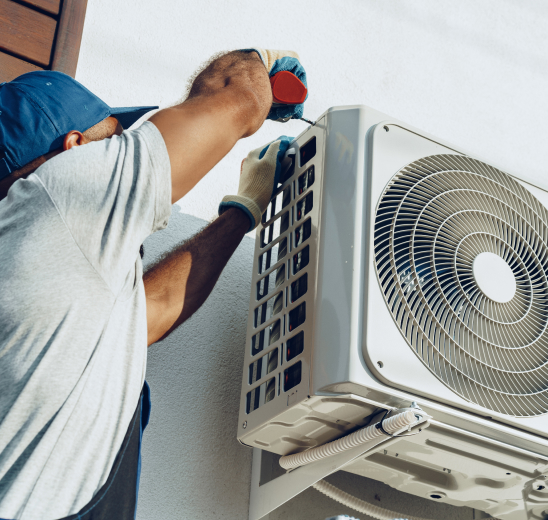Heating, commonly known as heating, ventilation, and air conditioning, plays a vital role in maintaining pleasant indoor environments in both domestic and commercial spaces. As you move through any office, you might not realize twice about the systems working unobtrusively behind the scenes to ensure that the air is at a pleasant temperature and quality. However, understanding the principles of heat transfer that govern these systems can greatly enhance our capability to manage them effectively.

In this manual, we will explore into the mechanics of HVAC, uncovering how these systems function and why they are essential. From introductory concepts for novices to tips on efficient maintenance and energy usage, we will explore various aspects of HVAC systems. Whether straight from the source considering an upgrade, looking to boost indoor air quality, or just wanting to lower your energy bills, this piece will provide the essential knowledge you need to make smart decisions about your heating and cooling systems.
Understanding HVAC Technologies
HVAC, Air Conditioning, and HVAC , typically called HVAC, represents an integral technology used for ensuring comfort in enclosed environments. At its core, an HVAC system works by regulating the temperature, moisture, and air standards of areas in residences and industrial structures. It does this through a series of linked components that perform the necessary functions of warmth generation, temperature reduction, and ventilation. Whether it’s a home setting or a large corporate building, comprehending how these systems function is vital for effective temperature regulation.
The key elements of an HVAC system comprise the heat source, chill source, fresh air system, and the thermostat. Heating can come from multiple options, including furnaces, thermal pumps, or heating boilers, which generate warmth during chillier periods. For cooling, cooling units or systems like chillers are employed to eliminate warm air from enclosed atmosphere, providing a cool atmosphere in the summer. Ventilation plays a critical part in ensuring fresh air circulates through the location, helping to maintain air quality and eliminate airborne pollutants.
Moreover, appropriate upkeep is essential to making sure HVAC mechanisms operate smoothly and last longer. AC installation can pinpoint typical concerns such as clogged screen filters or refrigerant losses before they escalate into more significant issues. Knowing how these installations operate not only enables homeowners and corporate leaders make informed decisions about functioning and upkeep but also enables them to create pleasant home and business atmospheres throughout the year. spintax #### Common HVAC Problems and Solutions
Homeowners often encounter a range of HVAC issues that can disrupt convenience and efficiency. One common issue is inadequate heating or cooling. This can occur due to a defective thermostat, blocked ducts, or low refrigerant levels. To resolve this problem, start by verifying the thermostat settings and changing batteries if needed. Next, inspect and clean air filters and ensure that vents are unobstructed. If problems persist, it may be necessary to call a qualified technician to inspect for refrigerant leaks or system malfunctions.
Another regular concern is unwanted noise coming from the HVAC unit. Noises like clattering, creaking, or hissing can suggest various problems, from wiggly components to failing motors. Homeowners should first inspect the outside unit for any debris that might be causing vibrations and make sure all screws and fasteners are secure. If the noise is severe or continuous, it is recommended to seek professional help to diagnose and fix the underlying issue, as ignoring it can lead to more significant damage.
Finally, subpar indoor air quality is an issue that many do not recognize as directly related to HVAC systems. Problems such as dust accumulation and allergens can stem from contaminated air filters or inadequate ventilation. To improve air quality, regular maintenance is crucial, including regular filter changes and duct cleaning. Installing air purifiers and choosing the right filters for your system can significantly enhance indoor air quality and overall well-being in the home.
Energy Effectiveness and Advancements in HVAC
The HVAC sector has experienced substantial progress in energy effectiveness, primarily due to the rising requirement for eco-friendly options. Modern units are engineered to maximize energy use while maintaining comfort in homes and business structures. Developments such as variable speed motors, zoned heating and cooling, and sophisticated heat exchangers permit HVAC systems to operate more optimally, reducing energy consumption and reducing utility bills.
Intelligent automation integration is another critical advancement driving energy conservation in HVAC units. Smart temperature controls and home automation technologies provide residents with unmatched control over their heating and cooling preferences. These tools can adapt to user habits, modify settings automatically based on occupancy, and provide real-time energy consumption information, all contributing to a more effective HVAC functioning. As intelligent gadgets continue to evolve, they will play an increasingly critical role in energy management.
Additionally, renewable energy sources, such as solar-powered HVAC units, are revolutionizing the field. These systems capture solar energy to reduce reliance on conventional power options, offering both environmental benefits and cost savings. Geothermal heating and cooling represents another novel solution, utilizing the earth's constant heat to provide efficient climate control. As these solutions become more accessible, residents and businesses can make knowledgeable choices that align with their commitment to sustainability and energy efficiency.
